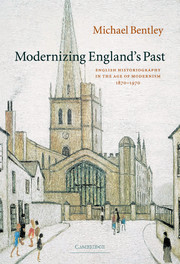Book contents
6 - The new eighteenth century
Published online by Cambridge University Press: 10 December 2009
Summary
Why did they study the eighteenth century? It is a question rarely asked of the modernists who committed their lives to it, not even of their most famous personalities, Namier and Butterfield, but behind it lies their world and the prefigurings of their historical thought. The nineteenth-century historians, Adolphus and Lecky apart, had raked their fire far more over the seventeenth and later the sixteenth century when they were not redesigning the medieval state. Perhaps the eighteenth century could only come into focus when whig history itself became sufficiently self-questioning to reflect critically on its own period of supreme self-satisfaction, and its exponents are therefore part of a generational instinct; but that thought probably puts the cart before the horse. Historians tend to adjust their sights only after someone or something compels them to revisit and reflect. It seems clear that some process of this kind had already developed momentum before the First World War. Yet it is less clear who began it and why; and we may have to think, in answering the question, about movements not only in English historiography but also elsewhere. Whatever the reason, the historiography of the eighteenth century became imbricated to a unique degree in the teaching of its substantive history during the twentieth.
Constitutional history perhaps supplied a strand of the argument, at least to the extent of providing a framework within which the discussion of law, liberty and tyranny – a discussion that became frenzied in the age of Butterfield and Namier – could find some of its reference points.
- Type
- Chapter
- Information
- Modernizing England's PastEnglish Historiography in the Age of Modernism, 1870–1970, pp. 144 - 168Publisher: Cambridge University PressPrint publication year: 2006



